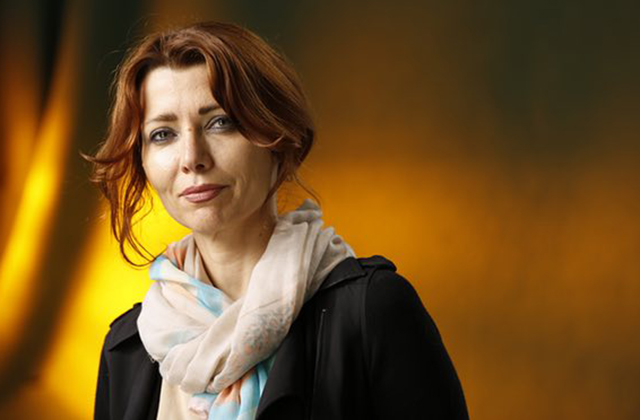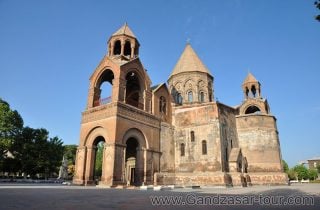Prosecution for novel “The Bastard of Istanbul” about the Armenian Genocide: Elif Shafak’s interview with Guardian

Elif Shafak is the most widely read female novelist in Turkey. She is also a political commentator. Three Daughters of Eve is an intense, discursive and absorbing novel about three middle-eastern women, each studying at Oxford, with dramatically contrasting views.
I was halfway through your chillingly prescient novel, which includes a terrorist incident, when the Istanbul bombing happened. How did you feel when you heard the news?
I was heartbroken, and horrified by hate speeches in which Islamist groups seemed to blame the victims for celebrating a Christian holiday. When writing the novel, I took a close look at Turkish society and its psychology. Fear is in the air, there is constant anxiety. I observed this at every level of Turkish society – subtle but strong. Something explodes in a kitchen in Istanbul and everyone throws themselves to the floor, thinking it might be a bomb. We have no memory, no time for analysis or even for grief. This was the psychology I wanted to capture in my book.
If the city were a person, how would you describe Istanbul?
Istanbul is a she – an active player. It is a city of conflict and resistance. Yet greed is destroying Istanbul – everywhere you go, you see gentrification without planning or regard for the city’s history.
In your 2010 TED talk, The Politics of Fiction, you said critics sometimes typecast you, expecting you to write sad stories about Muslims. Why?
It is because of identity politics – we are, sadly, becoming more tribal. The expectation seems to be that a writer from each tribe must tell the story of that tribe. I’m Turkish but also many other things. For me, imagination is a desire to transcend boundaries. When we write, we can be multiple.
“Three Daughters of Eve” is, in part, a meditation on faith. Do you – like your character, Peri – see God as an imposter?
Those of us on the liberal left have not done a good job in discussing faith’s secular aspects. Faith is not necessarily a religious concept. When you move to a new country because you have an irrational urge to do so, it is a secular act of faith. When you start writing a novel, with no clue whether it will succeed, it is a secular act of faith. When you fall in love and don’t know if the person will bring happiness to your life, and yet you leap – it is a secular act of faith. I don’t want religions to hijack faith. I want the concept of faith back.
You were born in Strasbourg, raised by a single mother – how did this affect you?
It had a huge impact. I didn’t see my father much. I met my two half-brothers in my mid-20s. I had to deal with being the other child. My father was a very good father to his sons but a very bad father to me. It took me a long time to accept that someone could succeed in many areas and fail in one. When my mother went back to college, my grandmother raised me. I called her Anne – mother in Turkish – and my own mother Abla, big sister.
And your mother became a diplomat…
This was unusual but she had studied hard, she was a linguist. She never married again. And she was able to do this because my less-educated grandmother supported her.
When did you realise you would become a novelist?
I started writing early because I was a lonely child. My life was boring, the world I created much more colourful. I’m aware of the pull of story land. Stefan Zweig writes about the urge to retreat into writing when the world is going crazy. I understand that but believe it is time for us writers to break out of our cocoons and speak out.
Your novel is about a charismatic teacher – Professor Azur. Was there a teacher who influenced you?
I don’t believe in heroes. People ask which of my women characters is most like me – the sinner, the believer or the confused. I’m none of these. If I may tell you a secret, I like to hide in my male characters. It was in the professor I tried to hide a little bit of myself.
How did your novel “The Bastard of Istanbul“ lead to a court case in Turkey?
Istanbul is a place of collective amnesia. Our history is full of ruptures and every new establishment that comes to power starts by erasing the legacy of the previous establishment. I write about minorities and wanted to address the unspeakable tragedies of the past, to talk about the Armenian genocide, share the grief, try to build bridges. The novel was widely read in Turkey but I was attacked by the nationalist media and put on trial under article 301, which is supposed to protect Turkishness against insults. This article is so vague, no one knows what it means. The trial took over a year. There were groups on the streets burning EU flags and spitting at my pictures. I was acquitted but it was a turbulent time. I had to live with a bodyguard, which was surreal. What made it still more surreal was that, for the first time in Turkey, a work of fiction was tried. My Turkish lawyer had to defend my fictional Armenian characters in the courtroom.
Mona, in your novel, wears the veil in defiance – do you understand her position?
Many women are asking: why do some women choose to cover their heads? We have to understand this and other questions. This is one of the biggest challenges for feminism today. What is worrying is that when women are divided into categories it is the status quo – the patriarchy – that benefits. Across the Middle East it is a huge problem because women live as islands. Conservative women with headscarves are one island, secularist modern women another. They don’t see they have things in common. If they could be sisters, there would be so much they could challenge.
Do you have a sense of your Turkish readership?
At book signings, there are feminists, liberals, women in headscarves, Sufis, Kurds, Jews, Armenians, Greeks, the LGBT community. They may not break bread together but their diversity matters to me. From the political elite, I’ve always received slander. Being a Turkish novelist feels like being slapped on one cheek and kissed on the other.
Does London feel like home to you?
It does – yet it is also possible to have portable homelands. If you’re in self-imposed exile, it is sad but enriches you intellectually and spiritually. I will always carry Istanbul in my soul.

























